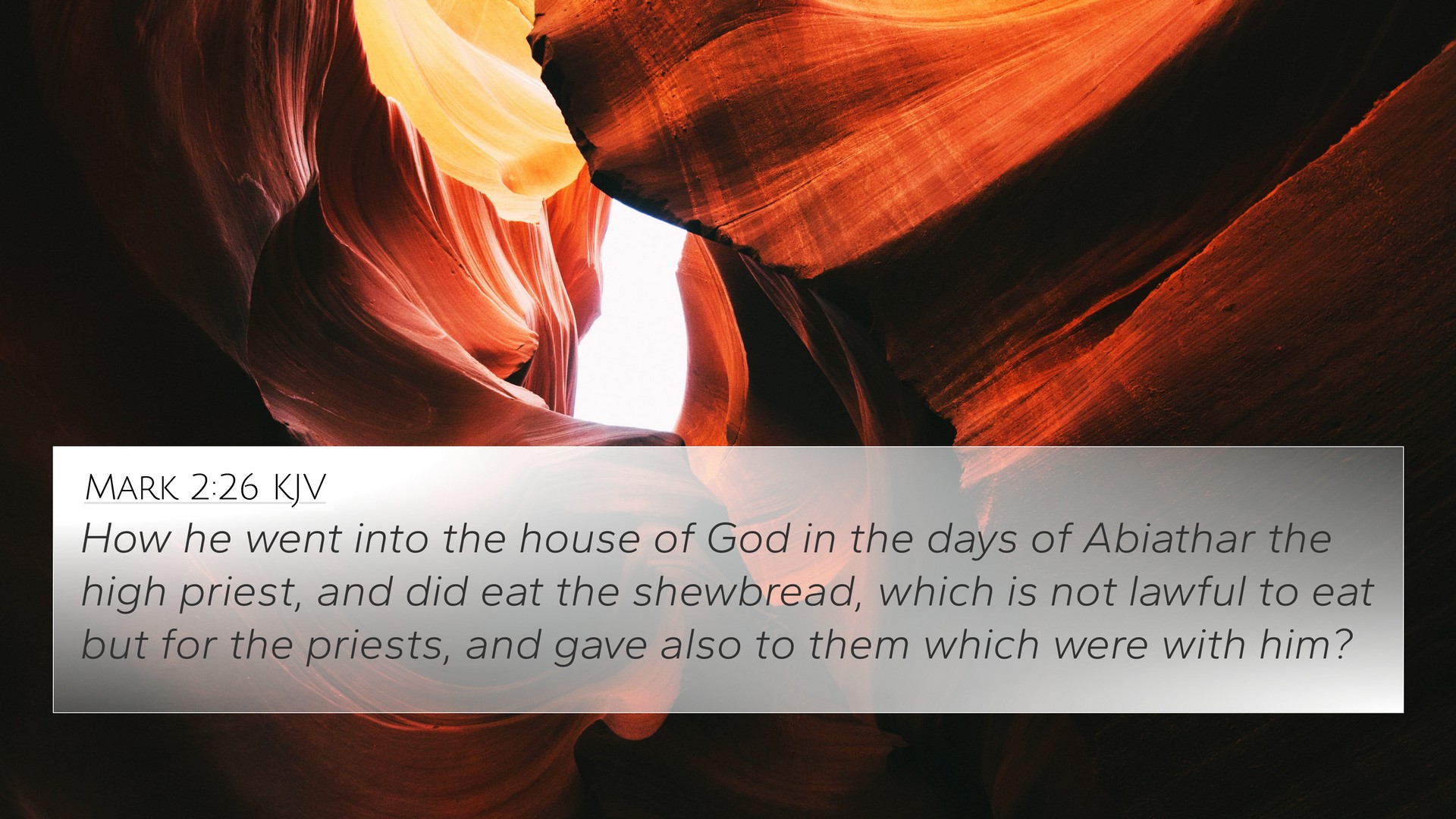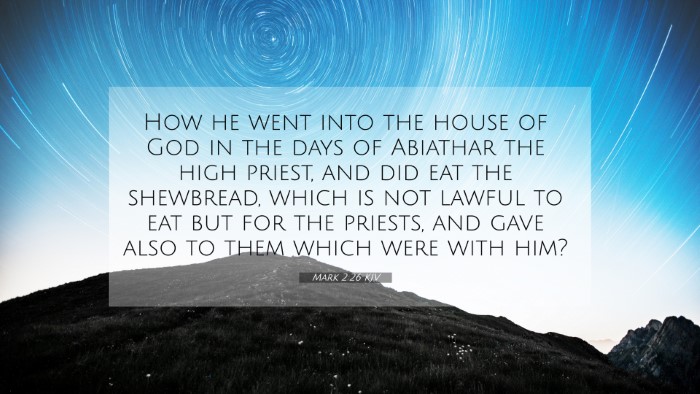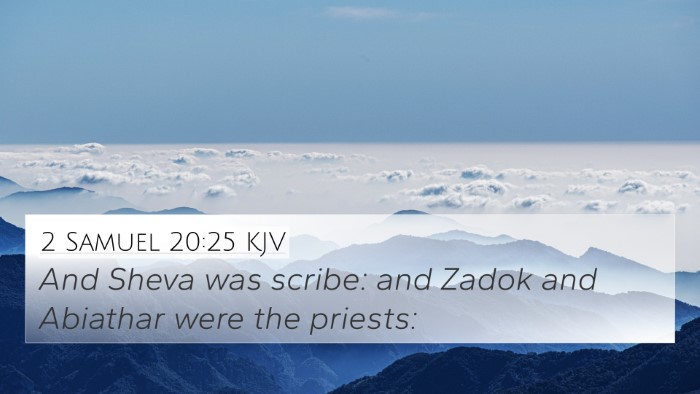Old Testament
Genesis Exodus Leviticus Numbers Deuteronomy Joshua Judges Ruth 1 Samuel 2 Samuel 1 Kings 2 Kings 1 Chronicles 2 Chronicles Ezra Nehemiah Esther Job Psalms Proverbs Ecclesiastes Song of Solomon Isaiah Jeremiah Lamentations Ezekiel Daniel Hosea Joel Amos Obadiah Jonah Micah Nahum Habakkuk Zephaniah Haggai Zechariah MalachiMark 2:26 Similar Verses
Mark 2:26 Cross References
How he went into the house of God in the days of Abiathar the high priest, and did eat the shewbread, which is not lawful to eat but for the priests, and gave also to them which were with him?
Uncover the Rich Themes and Topics of This Bible Verse
Listed below are the Bible themes associated with Mark 2:26. We invite you to explore each theme to gain deeper insights into the Scriptures.
Mark 2:26 Cross Reference Verses
This section features a detailed cross-reference designed to enrich your understanding of the Scriptures. Below, you will find carefully selected verses that echo the themes and teachings related to Mark 2:26 KJV. Click on any image to explore detailed analyses of related Bible verses and uncover deeper theological insights.
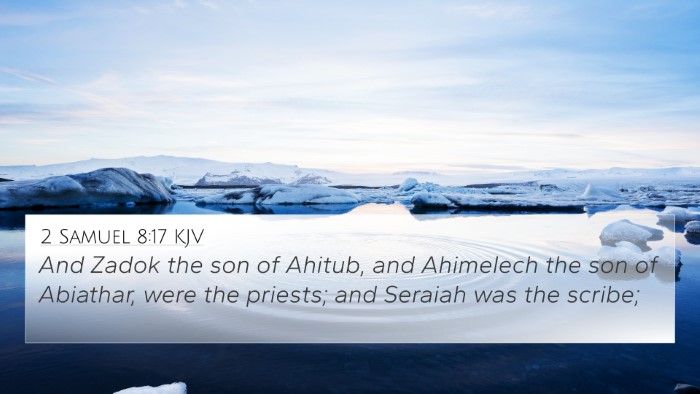
2 Samuel 8:17 (KJV) »
And Zadok the son of Ahitub, and Ahimelech the son of Abiathar, were the priests; and Seraiah was the scribe;
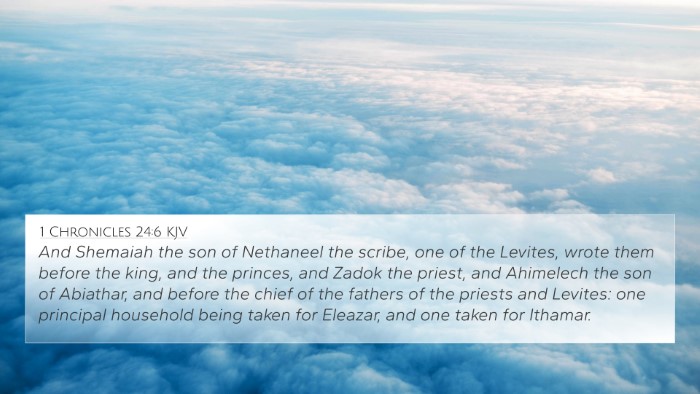
1 Chronicles 24:6 (KJV) »
And Shemaiah the son of Nethaneel the scribe, one of the Levites, wrote them before the king, and the princes, and Zadok the priest, and Ahimelech the son of Abiathar, and before the chief of the fathers of the priests and Levites: one principal household being taken for Eleazar, and one taken for Ithamar.
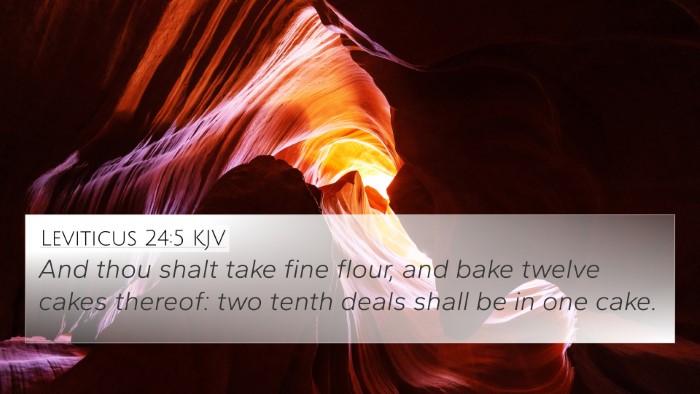
Leviticus 24:5 (KJV) »
And thou shalt take fine flour, and bake twelve cakes thereof: two tenth deals shall be in one cake.
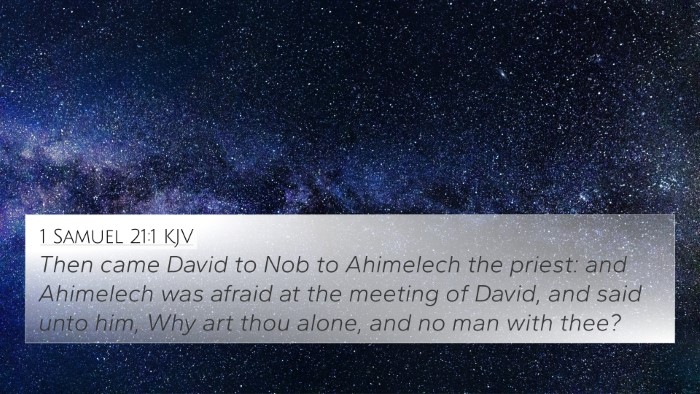
1 Samuel 21:1 (KJV) »
Then came David to Nob to Ahimelech the priest: and Ahimelech was afraid at the meeting of David, and said unto him, Why art thou alone, and no man with thee?
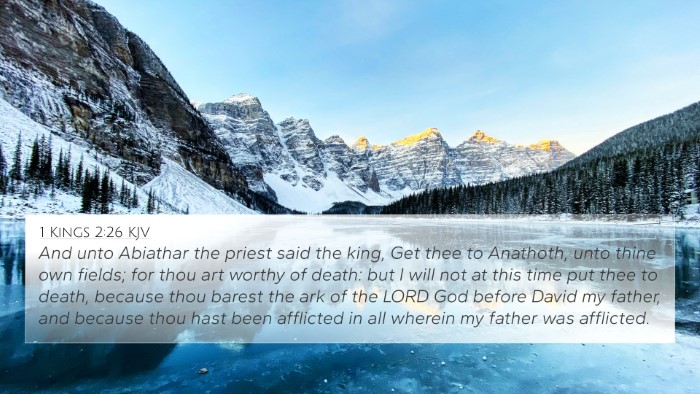
1 Kings 2:26 (KJV) »
And unto Abiathar the priest said the king, Get thee to Anathoth, unto thine own fields; for thou art worthy of death: but I will not at this time put thee to death, because thou barest the ark of the LORD God before David my father, and because thou hast been afflicted in all wherein my father was afflicted.
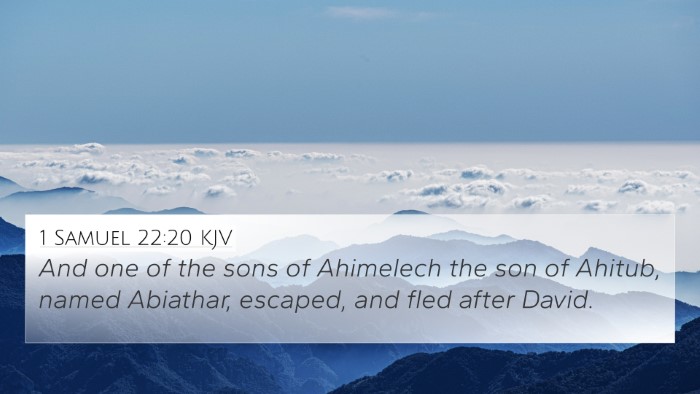
1 Samuel 22:20 (KJV) »
And one of the sons of Ahimelech the son of Ahitub, named Abiathar, escaped, and fled after David.
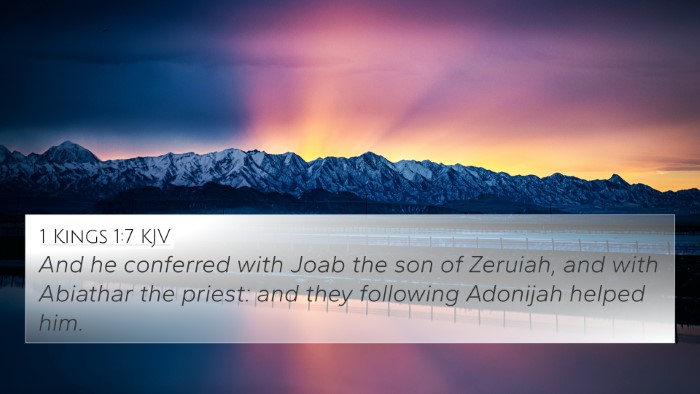
1 Kings 1:7 (KJV) »
And he conferred with Joab the son of Zeruiah, and with Abiathar the priest: and they following Adonijah helped him.
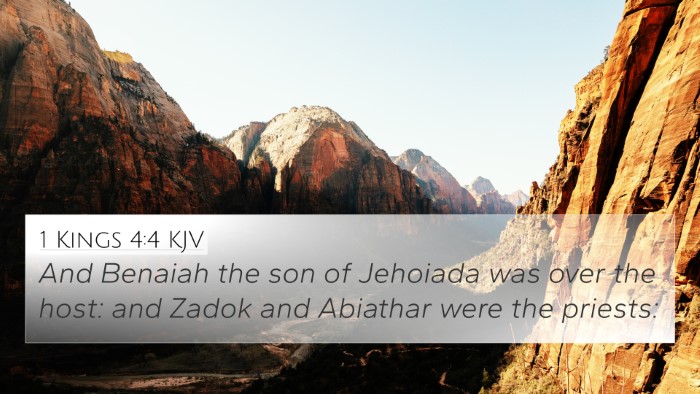
1 Kings 4:4 (KJV) »
And Benaiah the son of Jehoiada was over the host: and Zadok and Abiathar were the priests:
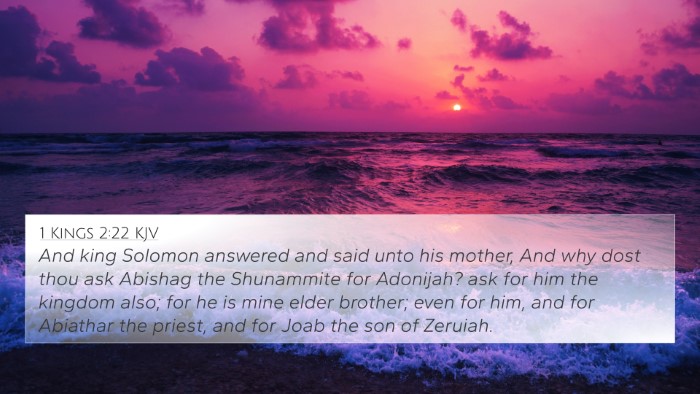
1 Kings 2:22 (KJV) »
And king Solomon answered and said unto his mother, And why dost thou ask Abishag the Shunammite for Adonijah? ask for him the kingdom also; for he is mine elder brother; even for him, and for Abiathar the priest, and for Joab the son of Zeruiah.
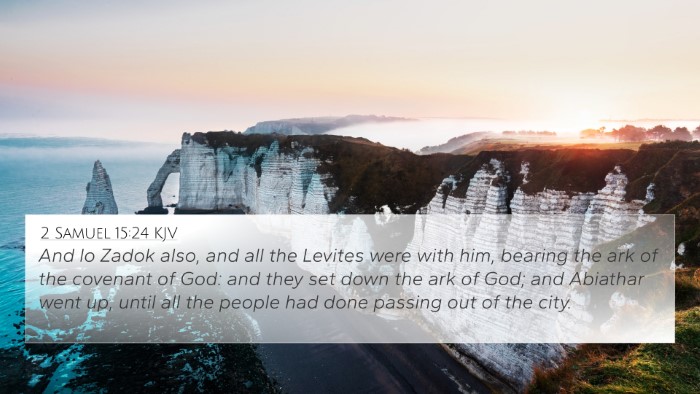
2 Samuel 15:24 (KJV) »
And lo Zadok also, and all the Levites were with him, bearing the ark of the covenant of God: and they set down the ark of God; and Abiathar went up, until all the people had done passing out of the city.
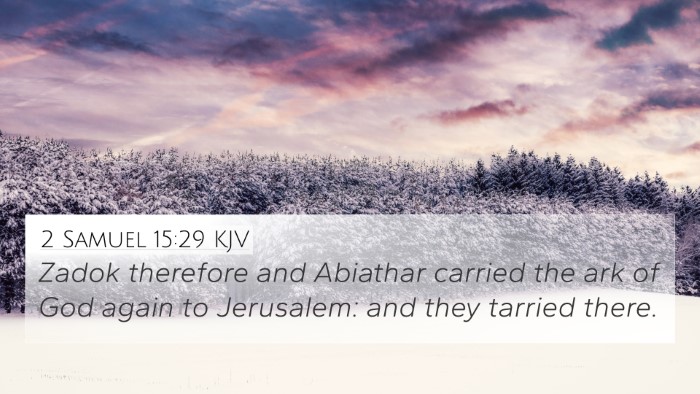
2 Samuel 15:29 (KJV) »
Zadok therefore and Abiathar carried the ark of God again to Jerusalem: and they tarried there.
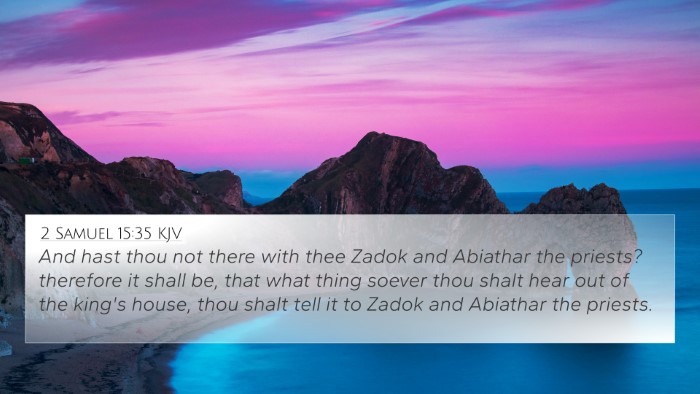
2 Samuel 15:35 (KJV) »
And hast thou not there with thee Zadok and Abiathar the priests? therefore it shall be, that what thing soever thou shalt hear out of the king's house, thou shalt tell it to Zadok and Abiathar the priests.
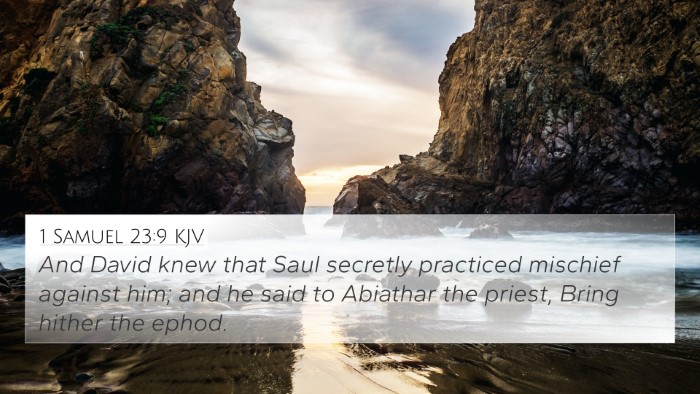
1 Samuel 23:9 (KJV) »
And David knew that Saul secretly practiced mischief against him; and he said to Abiathar the priest, Bring hither the ephod.

1 Samuel 23:6 (KJV) »
And it came to pass, when Abiathar the son of Ahimelech fled to David to Keilah, that he came down with an ephod in his hand.

Exodus 29:32 (KJV) »
And Aaron and his sons shall eat the flesh of the ram, and the bread that is in the basket by the door of the tabernacle of the congregation.
Mark 2:26 Verse Analysis and Similar Verses
Understanding Mark 2:26
Mark 2:26 states:
"How he went into the house of God in the days of Abiathar the high priest, and did eat the shewbread, which is not lawful to eat but for the priests, and gave also to them which were with him?"
This verse refers to an incident during the time of King David, shedding light on the nature of divine mercy and the understanding of religious law. It serves as a critical point in Jesus' discourse regarding the Sabbath and the spirit of the law versus the letter of the law.
Insights from Public Domain Commentaries
Exploring this verse reveals rich theological implications and connections with other scripture. Let's delve into insights from renowned Biblical commentators:
Matthew Henry's Commentary
Matthew Henry emphasizes the context in which David partook in the shewbread, indicating that the needs of man, particularly in dire circumstances, take precedence over ritual laws. David's hunger justified his actions, highlighting God's mercy and the principle that the Sabbath was made for man's benefit, not his detriment. Henry notes:
"It was not a crime for David to eat the shewbread, because necessity made it lawful."
Albert Barnes' Notes
Albert Barnes echoes this sentiment, illustrating how Jesus uses this historical account to challenge the rigid interpretations of the Pharisees. He points out that the shewbread was meant to be holy and set aside for priests, yet in a time of need, God allowed exceptions. Barnes observes:
"The use of the shewbread shows that God had made provision for mercy, even in the observance of sacred things."
Adam Clarke's Commentary
Adam Clarke elaborates by suggesting that this example from David's life defends the notion that human necessity can transcend ceremonial law. Clarke argues that the key message is about understanding God's will in the context of mercy rather than mere adherence to rules:
"If David was allowed to eat the shewbread, how much more should the apostles be excused for acts done under necessity?"
Connecting Mark 2:26 with Other Scriptures
This verse can be cross-referenced with several other significant Biblical texts:
- 1 Samuel 21:6: The original account of David eating the shewbread.
- Matthew 12:3-4: Jesus' reference to this event in the Gospel of Matthew.
- Exodus 25:30: The law pertaining to the shewbread and its purpose in the tabernacle.
- Luke 6:3-4: Another account of Jesus mentioning this incident to illustrate the nature of the Sabbath.
- Hebrews 4:9-10: Discusses the rest that Jesus represents, further reflecting on the concept of Sabbath.
- Romans 14:17: Emphasizes that the Kingdom of God is about righteousness, peace, and joy in the Holy Spirit, contrasting ritualistic compliance.
- John 7:22-23: References the practice of circumcision on the Sabbath, further illustrating Jesus' point about what is lawful.
Thematic Connections and Parallels
Mark 2:26 opens the door to various themes within Scripture and shows how verses relate to one another as part of a greater theological narrative:
- Mercy Over Sacrifice: This theme resonates throughout the Bible, emphasizing God’s desire for compassion rather than mere ritual following.
- The Nature of the Sabbath: Jesus redefined the understanding of sacred time, aligning it with human need and divine mercy.
- Leadership and Authority in Religious Practice: The roles of David and Jesus highlight how leaders interpret and redefine law within contexts of need.
- Divine Provision: Both David's and Jesus’ actions reflect God's provision for His people, even in unusual circumstances.
Conclusion
Mark 2:26 serves as a crucial example of how Jesus draws upon Old Testament events to reveal deeper truths about God's character and intention for humanity. Through the insights of Matthew Henry, Albert Barnes, and Adam Clarke, we see that the connections between this verse and others enhance our understanding of Biblical law, mercy, and the relational aspect of God’s love.
By exploring these themes, readers are encouraged to engage in Bible cross-referencing, enriching their study of Scripture as they uncover the inter-Biblical dialogue that links these profound truths together.
